Related Research Articles
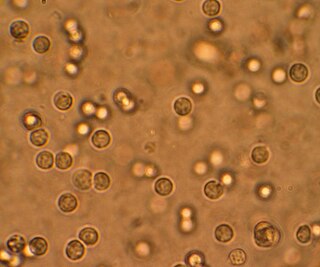
A urinary tract infection (UTI) is an infection that affects a part of the urinary tract. Lower urinary tract infections may involve the bladder (cystitis) or urethra (urethritis) while upper urinary tract infections affect the kidney (pyelonephritis). Symptoms from a lower urinary tract infection include suprapubic pain, painful urination (dysuria), frequency and urgency of urination despite having an empty bladder. Symptoms of a kidney infection, on the other hand, are more systemic and include fever or flank pain usually in addition to the symptoms of a lower UTI. Rarely, the urine may appear bloody. Symptoms may be vague or non-specific at the extremities of age.

Mannose is a sugar monomer of the aldohexose series of carbohydrates. It is a C-2 epimer of glucose. Mannose is important in human metabolism, especially in the glycosylation of certain proteins. Several congenital disorders of glycosylation are associated with mutations in enzymes involved in mannose metabolism.

Hexamethylenetetramine (HMTA), also known as 1,3,5,7-tetraazaadamantane, is a heterocyclic organic compound with diverse applications. It has the chemical formula (CH2)6N4 and is a white crystalline compound that is highly water soluble in water and polar organic solvents. It has a cage-like structure similar to adamantane. It is useful in the synthesis of other organic compounds, including plastics, pharmaceuticals, and rubber additives. It sublimes in vacuum at 280 °C. The molecule has a tetrahedral cage-like structure, similar to that of adamantane. Four vertices are occupied by nitrogen atoms, which are linked by methylene groups. Although the molecular shape defines a cage, no void space is available at the interior.
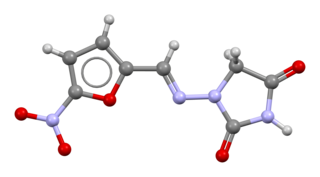
Nitrofurantoin, sold under the brand name Macrobid among others, is an antibacterial medication of the nitrofuran class used to treat urinary tract infections (UTIs), although it is not as effective for kidney infections. It is taken by mouth.

Amoxicillin/clavulanic acid, also known as co-amoxiclav or amox-clav, sold under the brand name Augmentin, among others, is an antibiotic medication used for the treatment of a number of bacterial infections. It is a combination consisting of amoxicillin, a β-lactam antibiotic, and potassium clavulanate, a β-lactamase inhibitor. It is specifically used for otitis media, streptococcal pharyngitis, pneumonia, cellulitis, urinary tract infections, and animal bites. It is taken by mouth or by injection into a vein.

Pyelonephritis is inflammation of the kidney, typically due to a bacterial infection. Symptoms most often include fever and flank tenderness. Other symptoms may include nausea, burning with urination, and frequent urination. Complications may include pus around the kidney, sepsis, or kidney failure.

Cranberry juice is the liquid juice of the cranberry – a fruit recognized for its bright red color, tart taste, and versatility for product manufacturing. Major cranberry products include cranberry juice, dried cranberry, cranberry sauce, frozen cranberry, cranberry powder, and dietary supplements containing cranberry extracts.
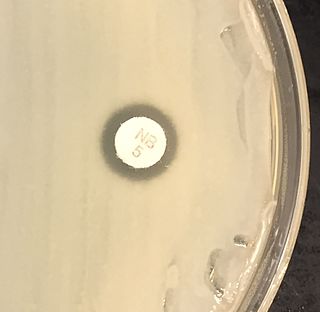
Staphylococcus saprophyticus is a Gram-positive coccus belonging to the genus Staphylococcus. S. saprophyticus is a common cause of community-acquired urinary tract infections.

Vesicoureteral reflux (VUR), also known as vesicoureteric reflux, is a condition in which urine flows retrograde, or backward, from the bladder into one or both ureters and then to the renal calyx or kidneys. Urine normally travels in one direction from the kidneys to the bladder via the ureters, with a one-way valve at the vesicoureteral (ureteral-bladder) junction preventing backflow. The valve is formed by oblique tunneling of the distal ureter through the wall of the bladder, creating a short length of ureter (1–2 cm) that can be compressed as the bladder fills. Reflux occurs if the ureter enters the bladder without sufficient tunneling, i.e., too "end-on".
In urology, voiding cystourethrography (VCUG) is a frequently performed technique for visualizing a person's urethra and urinary bladder while the person urinates (voids). It is used in the diagnosis of vesicoureteral reflux, among other disorders. The technique consists of catheterizing the person in order to fill the bladder with a radiocontrast agent, typically diatrizoic acid. Under fluoroscopy the radiologist watches the contrast enter the bladder and looks at the anatomy of the patient. If the contrast moves into the ureters and back into the kidneys, the radiologist makes the diagnosis of vesicoureteral reflux, and gives the degree of severity a score. The exam ends when the person voids while the radiologist is watching under fluoroscopy. Consumption of fluid promotes excretion of contrast media after the procedure. It is important to watch the contrast during voiding, because this is when the bladder has the most pressure, and it is most likely this is when reflux will occur. Despite this detailed description of the procedure, at least as of 2016 the technique had not been standardized across practices.

Bacteriuria is the presence of bacteria in urine. Bacteriuria accompanied by symptoms is a urinary tract infection while that without is known as asymptomatic bacteriuria. Diagnosis is by urinalysis or urine culture. Escherichia coli is the most common bacterium found. People without symptoms should generally not be tested for the condition. Differential diagnosis include contamination.
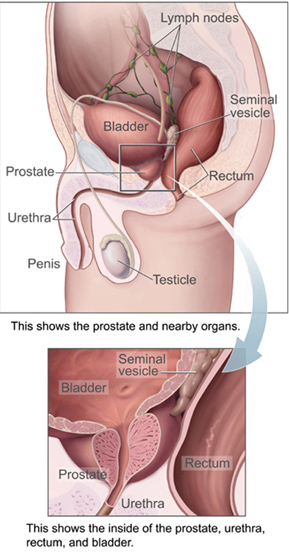
Chronic bacterial prostatitis is a bacterial infection of the prostate gland. It should be distinguished from other forms of prostatitis such as acute bacterial prostatitis and chronic pelvic pain syndrome (CPPS).

Chronic prostatitis/chronic pelvic pain syndrome (CP/CPPS), previously known as chronic nonbacterial prostatitis, is long-term pelvic pain and lower urinary tract symptoms (LUTS) without evidence of a bacterial infection. It affects about 2–6% of men. Together with IC/BPS, it makes up urologic chronic pelvic pain syndrome (UCPPS).

Pivmecillinam (INN), or amdinocillin pivoxil (USAN), sold under the brand name Selexid and Pivya among others, is an orally active prodrug of mecillinam, an extended-spectrum penicillin antibiotic. Pivmecillinam is the pivaloyloxymethyl ester of mecillinam.

Purple urine bag syndrome (PUBS) is a medical syndrome where purple discoloration of urine collection bag occurs in people with urinary catheters and co-existent urinary tract infections. PUBS is most prevalent in elderly females with constipation. Constipation alters the gut bacteria, reducing gastrointestinal motility and leading to increased growth of bacteria in the colon. High bacterial counts in urine are the most important factor causing purple urine bag syndrome. Bacteria in urine produce the enzyme indoxyl sulfatase. This converts indoxyl sulfate in the urine into the red and blue colored compounds indirubin and indigo. People with urinary tract infections using catheters will increase the conversion of indoxyl sulfatase to indirubin and indigo. Indirubin dissolves in plastic and therefore causes urine discoloration. The purple discoloration is the result of reaction between indirubin and plastic urine bags, as well as the presence of indigo. Bacteria in the urine can be found through bacteria culture test. People with purple urine bag syndrome may present with elevated bacterial loads on their culture tests when compared to those who are not affected by this syndrome. The most commonly implicated bacteria are Providencia stuartii, Providencia rettgeri, Klebsiella pneumoniae, Proteus mirabilis, Escherichia coli, Morganella morganii, and Pseudomonas aeruginosa. Purple urine bag syndrome treatment should aim for underlying issues rather than the condition itself. The purple discoloration is harmless and can be resolved with treatments targeted to specific bacteria or any underlying medical conditions. Treatment also consists of providing comfort to both patients and their family, administering antibiotics and performing regular catheter changes. The prognosis is good, however, the morbidity and mortality rates associated with PUBS are elevated depending on patient's underlying health status.
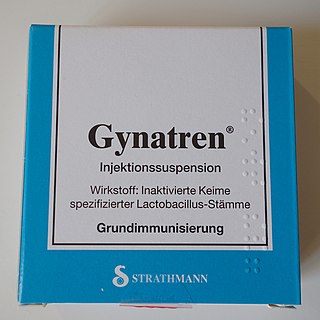
Lactobacillus vaccines are used in the therapy and prophylaxis of non-specific bacterial vaginitis and trichomoniasis. The vaccines consist of specific inactivated strains of Lactobacilli, called "aberrant" strains in the relevant literature dating from the 1980s. These strains were isolated from the vaginal secretions of patients with acute colpitis. The lactobacilli in question are polymorphic, often shortened or coccoid in shape and do not produce an acidic, anti-pathogenic vaginal environment. A colonization with aberrant lactobacilli has been associated with an increased susceptibility to vaginal infections and a high rate of relapse following antimicrobial treatment. Intramuscular administration of inactivated aberrant lactobacilli provokes a humoral immune response. The production of specific antibodies both in serum and in the vaginal secretion has been demonstrated. As a result of the immune stimulation, the abnormal lactobacilli are inhibited, the population of normal, rod-shaped lactobacilli can grow and exert its defense functions against pathogenic microorganisms.
Harry Lee Thompson Mobley, Ph.D, is the Frederick G. Novy Distinguished University Professor of Microbiology and Immunology at the University of Michigan Medical School. His research focused on elucidating the mechanisms by which Gram-negative bacilli that include E. coli, Proteus mirabilis, Klebsiella pneumoniae, Citrobacter freundii, Serratia marcescens, Acinetobacter baumannii, and Helicobacter pylori colonize initial sites of infections that include the urinary tract, the lungs, and the gastrointestinal tract, in some cases, disseminating systemically and entering the bloodstream and the blood-filtering organs including the spleen and liver. For decades, the lab studied urinary tract infection including both “uncomplicated” UTI in otherwise healthy women and “complicated” UTI such as catheter-associated UTI. Bacterial infections of the bladder can ascend to the kidneys and enter renal capillaries to gain access to the bloodstream and infect blood-filtering organs. His research focused on the mechanism by which Gram-negative bacilli colonize the human host, elude the innate immune response, and disseminate from primary sites of infection including the urinary tract into the bloodstream.
LACTIN-V, also known as CTV-05 or as Lactobacillus crispatus CTV-05, is a live biopharmaceutical medication containing a strain of Lactobacillus crispatus which is under development for the treatment of urinary tract infections (UTIs) and bacterial vaginosis (BV). It is administered intravaginally and is described as the first vaginal microbiome (VMB)-based live biotherapeutic product (LBP).
Uromune, also known by its developmental code name MV-140, is a polyvalent bacterial vaccine which is used and is being developed for prevention of recurrent urinary tract infections (UTIs). In clinical studies, it has been found to reduce total number of UTIs by about 70%, to increase UTI-free rates from around 25% to 57%, and to increase time to next UTI from about 1.6 months to 9.0 months. It has also been found to reduce subjective UTI symptoms, reduce antibiotic use, and improve quality of life. The effectiveness of the vaccine appears to decrease with time, which might warrant readministration. Uromune is used as a sublingual spray once daily for 3 months.

Urinary anti-infective agent, also known as urinary antiseptic, is medication that can eliminate microorganisms causing urinary tract infection (UTI). UTI can be categorized into two primary types: cystitis, which refers to lower urinary tract or bladder infection, and pyelonephritis, which indicates upper urinary tract or kidney infection. Escherichia coli is the predominant microbial trigger of UTIs, accounting for 75% to 95% of reported cases. Other pathogens such as Proteus mirabilis, Klebsiella pneumoniae, and Staphylococcus saprophyticus can also cause UTIs.
References
- 1 2 Nickel JC, Saz-Leal P, Doiron RC (August 2020). "Could sublingual vaccination be a viable option for the prevention of recurrent urinary tract infection in Canada? A systematic review of the current literature and plans for the future". Can Urol Assoc J. 14 (8): 281–287. doi:10.5489/cuaj.6690. PMC 7402698 . PMID 33626320.
- 1 2 Prattley S, Geraghty R, Moore M, Somani BK (May 2020). "Role of Vaccines for Recurrent Urinary Tract Infections: A Systematic Review". Eur Urol Focus. 6 (3): 593–604. doi:10.1016/j.euf.2019.11.002. PMID 31806578.
- ↑ Doiron RC, Cotechini T, Nickel JC (June 2024). "It's Time to Embrace Vaccination as We Enter the Postantibiotic Era of Recurrent Urinary Tract Infection Management". J Urol. 211 (6): 797–799. doi:10.1097/JU.0000000000003969. PMID 38704743.
- ↑ "OM 8980". AdisInsight. 16 August 2022. Retrieved 11 October 2024.
- ↑ Mak Q, Greig J, Dasgupta P, Malde S, Raison N (April 2024). "Bacterial Vaccines for the Management of Recurrent Urinary Tract Infections: A Systematic Review and Meta-analysis". Eur Urol Focus. doi:10.1016/j.euf.2024.04.002. PMID 38644097.
- ↑ Litschgi M (February 1987). "Harnwegsinfektbehandlung mit SolcoUrovac" [Treatment of urinary tract infections with SolcoUrovac]. Geburtshilfe Frauenheilkd (in German). 47 (2): 107–110. doi:10.1055/s-2008-1035786. PMID 3106132.
- ↑ "JNJ 63871860". AdisInsight. 5 November 2023. Retrieved 11 October 2024.
- ↑ "SEQ 400". AdisInsight. 15 September 2023. Retrieved 11 October 2024.
- ↑ Nickel, J. Curtis; Doiron, R. Christopher (21 February 2023). "An Effective Sublingual Vaccine, MV140, Safely Reduces Risk of Recurrent Urinary Tract Infection in Women". Pathogens. 12 (3): 359. doi: 10.3390/pathogens12030359 . PMC 10052183 . PMID 36986281.
- ↑ Rapaport, Lisa (April 11, 2024). "Experimental Uti Vaccine Offers Potential Alternative to Antibiotics". Everyday Health. Retrieved 6 May 2024.